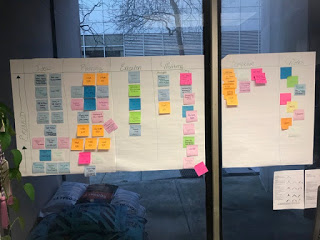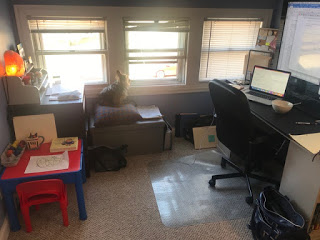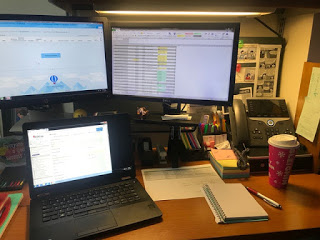I am Nicole Pierce, and This is How I Work as an Academic Parent
 Today, I have the pleasure of interviewing Nicole Pierce in the How I Work series – the Academic Parents edition.
Today, I have the pleasure of interviewing Nicole Pierce in the How I Work series – the Academic Parents edition.
General:
Current Job: Nurse Scientist
Current Location: Chicago, IL
Current mobile device: iPhone 10
Current computer: personal – MacBook Pro (2015); work – Dell Inspiron (year unknown)
Can you briefly explain your current situation and research to us?
Currently, I am a hospital-based nurse scientist. In addition to administrative duties like running the Nursing Evidence-Based Practice and Research Council and ensuring student projects maintain appropriate protections for patient data, I also conduct research. My personal research is focused on pain and health disparities in vascular disease outcomes, but I also conduct research in any area that my hospital requires. Occasionally this is with staff nurses – for example, I’m currently working with an emergency department nurse who wanted to examine compassion fatigue in the emergency department – but I also have close research partnerships with various physician and leadership teams. This typically means I have a lot of studies ongoing at the same time! Right now, I think I have 15 active studies. The majority I am acting as PI, but some I am involved with solely as data manager/statistics support.
What tools, apps and software are essential to your workflow?
My hospital uses Outlook for our email server, so I depend on the use of the calendar and tasks tabs within Outlook. I am a big proponent of blocking time on my calendar to dedicate to either big projects or pomodoros. For the pomodoros, I do use a pomodoro app (currently using Pomodoro by WON JO in the Apple App Store) to help me maintain timing. To help maintain my focus, I like to take a break for meditation at lunch (this has become even more important as I am currently working from home with two kids!); for this, I use the Calm app.
SAS is my preferred statistics software, though I will use SPSS or R as needed. I also employ some hard-copy tools – for example, my project tracker (see hospital office picture) features colorful post-it notes to help me track progress of each individual project; each color post-it is unique to a type of project (research, QI, EBP, manuscript, abstract/poster, etc.), and the color of Sharpie used indicates which of my personal interest areas the project crosses. I keep trying to switch to digital notes, but I remain fairly attached to my pad of engineering paper. I am also a huge proponent of my Ink+Volt planner – I use the daily sections to track progress toward my goals, which has helped me be able to look back and see how much progress I have made (which is so nice for those long projects that seem to never be moving forward).
What does your workspace setup look like?
I currently have two workspaces: my hospital office and my home office. For the last two months, I have been exclusively working out of my home office. To adjust for life during COVID, we did move a small desk into my office so my two-year old has a space to color and play with toys; this has made it a lot easier to continue to get work done. We also found an old flat-screen tv (75 inches, I think?) and turned that into a dual-monitor set-up. This was absolutely instrumental – I’m a bit spoiled and was so used to working with dual monitors that I had to find a way to get one at home. I have a large desk to accommodate my notepad, coffee, water bottle, and planner, as well as both my personal and work laptops. Smell is important to me in a workspace, so I always have something to improve the smell (at home, I use candles; in the hospital, I use an oil warmer). My hospital office is actually located off the lobby of the building, so it’s typically pretty noisy. I always have a pair of wireless headphones to help me block out sound and concentrate. Beyond that, it has floor-to-ceiling windows on the other side that I use for my project tracker. Coworkers often comment on how homey I have made my office – I want it to be a place I feel comfortable in so I can be at my most productive!


What is your best advice for productive academic work?
Daily goals! I love being able to check things off; however, those goals don’t work if they aren’t realistic. Especially during this time, I think we all need to think about what is truly possible each day given all the change and potentially extra demands. Consistency is also so important for me to get work done. I plan out my goals for the next day before I finish for the day and map out when I will work on each part. I also map out time for a daily walk (every day at 1130!), lunch with the kids, email (trying to get down to checking it only three times a day), and reading (both academic reading and fun reading).
What is your best advice for academic parents?
Be realistic. I tried for so long to do more than what was really realistic in one day – and I would stay up until all hours of the night, spend no time with my kids, and didn’t take care of myself. I was miserable and I missed out on so much with my kids – so I decided it was time for a change. It was so important to accept that while I couldn’t always be present for every event for my kids (they always schedule Moms and Muffins at my kid’s school for my busiest day of meetings, I swear), I can be present and active in their lives. Do I still sometimes bring a manuscript with me to baseball games? Sure – but I no longer feel guilty if I don’t actually look at it while I’m out. I also learned to prioritize self-care, and that has made me more productive. If I feel relaxed and well-rested, I think better, I write better, and I code better.
How do you keep an overview of projects and tasks?
My project board is key for tracking projects; for tracking individual tasks, I typically use my Tasks list in Outlook. However, right now, I’m a pretty big fan of making short lists on post-it notes for each day and keeping those on my desk.
Besides phone and computer, do you use other technological tools in work and daily life?
I have an Apple Watch that I love – when I am in patient rooms or in the lab, I can check what incoming messages I have or see where I’m headed next without cross-contamination. I also have an iPad – I use it at work all the time when we have survey studies or when I’m out talking to staff nurses about ongoing work in our Nursing Research department.
Which skill makes you stand out as an academic?
My organization – multiple people have copied my project board, filing system, and file labeling systems.
What do you listen to when you work?
Depends on the type of work I’m doing. If it is something that requires a lot of attention (manuscript writing, detailed data work), then I typically listen to classical music. Bach is a personal favorite, especially when performed by Yo-Yo Ma. When it’s something less intense, then I alternate between the Beatles, Johnny Cash, and the Struts. I’m also trying to get into podcasts – currently, the Fake Doctors, Real Friends podcast has kept me happy (I loved Scrubs).
What are you currently reading? How do you find time for reading?
I keep a very active Goodreads account! Currently, I’m reading Segregation by Design by Jessica Trounstine; up next is Little Fires Everywhere by Celeste Ng. While I was working on my dissertation, I had completely stopped reading for fun – and I missed it! So I prioritize it now. Pre-COVID, I would take my boys to the library every Saturday and we would pick out new books for the week. I wanted to model good habits for my boys, so we established reading time. I also try to read for 30 minutes before bed to make sure I cut down on screen time. Ensuring I always have books that I want to read nearby has made this easier.
Are you more of an introvert or extrovert? How does this influence your working habits?
I am more of an introvert at heart, and it seems I primarily work with extroverts. People walk into my office all the time, which can be startling and can really throw me off (particularly when I’m working with data). To help me manage this, I have made signs for my office door that let people know if I’m available/what I’m doing. My introversion has also led me to find other spots on my hospital campus to work that are away from the hustle and bustle of my office area. I frequently work with my laptop from the library, a rarely-used lounge that gives me great views of the city, and sometimes even in a nearby park.
What’s your sleep routine like? Has it changed significantly since becoming a parent?
When I first became a parent, I was 21 and working the nightshift – so I really didn’t have good sleeping habits at that point and I was young enough that it didn’t seem to matter! Since taking my current job and having a second child, my sleep habits changed significantly. I started going to bed between 9 and 10p and waking up at 0430 to head to the gym. Now with COVID, I’ve been heading to bed closer to 11 and getting up at 6. I like to do something relaxing before bed – maybe take a bath, maybe some yoga. Then I read 30 minutes before going to bed, usually with a mug of chamomile tea.
What’s your work routine like?
I try to reserve my mornings for pomodoros – quick tasks like project reviews, IRB reviews, or administrative tasks that don’t take much brainpower. This lets me feel a sense of accomplishment early, and then I feel better about my day! My afternoons are reserved for heavy-thinking projects – manuscripts, data working. I also try to keep Mondays and Wednesdays meeting-free to ensure I have full days available to work on big projects if needed. I take a walk every day at 1130, followed by lunch and meditation.
How is it like to be a parent where you work? Are your colleagues supportive and understanding?
Children are very common in my workplace, and my colleagues have been very supportive. I’ve had to leave midday to get sick kids and it was not a problem.
How much maternity or paternity leave (if any) did you get and was it paid leave?
I had started my job less than 6 months before having my second child, so I was still on probation and had no leave available. Despite that, my boss made sure that I could take off two weeks and then slowly ease back in by working from home for 6 weeks and then coming on site part-time for the next month. I wish I could have had a full 3 months leave to spend time with my little guy – but it was better than it could have been.
Which childcare services are you using? Does university provide support in finding and funding childcare?
My youngest goes to an in-home childcare location that we initially found on Facebook, and my oldest is in school all day. My workplace did not provide support in finding childcare.
How is your parenting style?
I’m not sure I have a parenting style – I try to parent each of my kids the way they need parenting at the moment. I love running around and playing with them, but I also want to ensure they are staying on track, learning good habits, and constantly learning. I definitely encourage them to read, make music, and color – anything that will help with brain development!
What’s the best advice you ever received?
Don’t be your own worst enemy. I had to learn self-confidence, and I would often make things more difficult for myself just because I felt I needed to be more. Once I moved past that, life was much, much easier.
